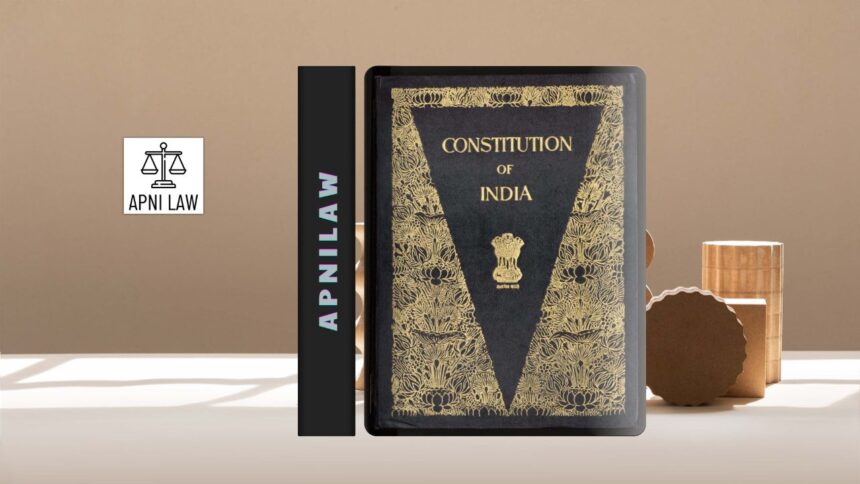Introduction
The National Commission for Scheduled Tribes (NCST) is a constitutional body established under Article 338A of the Indian Constitution. It safeguards the rights, welfare, and development of Scheduled Tribes (STs) across India. The Commission acts as a watchdog and advisory body, ensuring that constitutional protections and welfare measures for tribal communities are effectively implemented.
What Is Article 338A Of The Indian Constitution?
Article 338A was inserted by the Constitution (Eighty-Ninth Amendment) Act, 2003, which came into effect on 19 February 2004. Before this amendment, the same body, established under Article 338, looked after both Scheduled Castes (SCs) and Scheduled Tribes (STs). However, due to the distinct socio-economic challenges faced by tribal communities, the government decided to bifurcate the Commission, creating a separate body dedicated solely to Scheduled Tribes.
This separation allowed for a more specialized focus on tribal welfare, protection of land rights, cultural preservation, and promotion of educational and economic opportunities for STs.
Why Was The National Commission For Scheduled Tribes Created?
The creation of the NCST was driven by the need to ensure that the constitutional safeguards meant for Scheduled Tribes were properly enforced. Tribes in India face unique challenges such as displacement from ancestral lands, lack of access to education, and limited representation in decision-making.
The Commission was established to address these issues through investigation, monitoring, and advisory roles. It also ensures that government policies and laws are aligned with the constitutional goal of equality and justice for tribal populations.
How Is The NCST Composed?
The NCST consists of a Chairperson, Vice-Chairperson, and three other members, including at least one woman. All members are appointed by the President of India.
The tenure of each member is generally three years, and reappointment is allowed only once. The service conditions, salaries, and allowances of the members are determined by the President. This structure ensures independence, continuity, and effective functioning of the Commission.
What Are The Main Powers Of The NCST?
The NCST enjoys extensive powers similar to those of a civil court. It can summon witnesses, demand documents, take evidence under oath, and require public authorities to provide necessary information.
These powers enable the Commission to investigate complaints, monitor implementation of laws, and review the working of welfare schemes for Scheduled Tribes. It ensures that both Union and State governments comply with constitutional safeguards and policy commitments toward tribal welfare.
What Are The Functions Of The NCST?
The National Commission for Scheduled Tribes performs several vital functions to promote justice and equality. It investigates and monitors the implementation of constitutional and legal safeguards for STs. It inquires into complaints regarding the deprivation of rights or violation of safeguards.
The Commission also advises the Union and State Governments on policy matters affecting the social, economic, and educational advancement of tribal communities. It participates in planning and evaluating the progress of tribal development programs.
Every year, the NCST submits annual and special reports to the President of India. These reports highlight the status of implementation of safeguards and suggest corrective measures. The President then places these reports before Parliament, ensuring transparency and accountability.
How Does The Commission Protect Tribal Rights?
The NCST plays a critical role in protecting the cultural, land, and political rights of Scheduled Tribes. It monitors laws related to land alienation, forest rights, and displacement due to industrial or development projects.
For example, under the Scheduled Tribes and Other Traditional Forest Dwellers (Recognition of Forest Rights) Act, 2006, the NCST ensures that tribal communities have rightful access to forest land and resources. It also advocates for protection against illegal eviction and supports the preservation of traditional livelihoods.
The Commission further promotes tribal culture and languages, recommending measures to safeguard their unique heritage and traditions.
What Is The Procedure For Handling Complaints?
If a member of a Scheduled Tribe faces discrimination, exploitation, or denial of rights, they can approach the NCST. The Commission has the authority to investigate such complaints, summon responsible authorities, and recommend necessary corrective action.
The NCST may forward its findings to the concerned government departments for prompt implementation. Its reports carry moral and administrative weight, ensuring that government agencies act on its recommendations to protect tribal rights.
How Does The NCST Advise Governments On Policy?
The Commission acts as an advisor to both the Central and State Governments. It reviews the effectiveness of development schemes and policies aimed at improving education, healthcare, employment, and infrastructure in tribal areas.
Based on its findings, the NCST suggests amendments to laws and administrative measures. It also encourages the inclusion of tribal voices in local governance through Panchayati Raj Institutions, as envisaged under the Panchayats (Extension to Scheduled Areas) Act, 1996.
What Is The Jurisdiction Of The NCST?
The NCST’s jurisdiction extends across all states and union territories where Scheduled Tribes reside. It examines the working of constitutional provisions such as Articles 15, 16, 46, and 275, which guarantee equality, representation, and welfare for STs.
It also reviews the functioning of ministries, departments, and institutions involved in tribal affairs. The Commission ensures that budget allocations for tribal development are properly utilized and reach the intended beneficiaries.
How Is The NCST Different From The National Commission For Scheduled Castes?
While both commissions share similar constitutional status and powers, their focus areas differ. The National Commission for Scheduled Castes (NCSC) deals with issues related to Scheduled Castes, while the NCST specifically addresses matters concerning Scheduled Tribes.
The bifurcation in 2003 allowed each commission to specialize in its respective domain, leading to more focused research, policy advice, and intervention in cases of discrimination or rights violations.
What Are Some Examples Of The NCST’s Work?
The NCST has been instrumental in highlighting tribal displacement issues in forest areas and large development projects. It has reviewed the implementation of the Forest Rights Act, Land Acquisition laws, and Tribal Sub-Plan allocations.
In various cases, the Commission has recommended compensation for displaced tribes, better rehabilitation measures, and stronger safeguards against exploitation by private contractors or local authorities.
It also promotes education initiatives like Eklavya Model Residential Schools (EMRS), which aim to provide quality education to tribal children while preserving their culture and identity.
Why Is The NCST Important For India’s Democracy?
The NCST plays a crucial role in ensuring inclusive governance. Scheduled Tribes constitute a significant portion of India’s population, and their participation in the country’s development is essential for social justice.
The Commission bridges the gap between government policy and ground realities by acting as both a watchdog and an advisor. It ensures that the voices of tribal communities are heard at the highest levels of governance.
By addressing issues such as displacement, cultural erosion, and socio-economic exclusion, the NCST strengthens the democratic values of equality and fairness enshrined in the Constitution.
For any specific query call at +91 – 8569843472
Conclusion
The National Commission for Scheduled Tribes (NCST) under Article 338A stands as a vital pillar of India’s constitutional framework for social justice. It ensures that the rights and dignity of tribal communities are protected and that development reaches them equitably.
Through its investigative powers, advisory functions, and reports to the President, the NCST plays a decisive role in influencing policies and ensuring accountability in governance.
Ultimately, the Commission embodies India’s constitutional promise of “Justice, Equality, and Dignity” for all, reaffirming the nation’s commitment to the empowerment and inclusive development of its tribal citizens.








